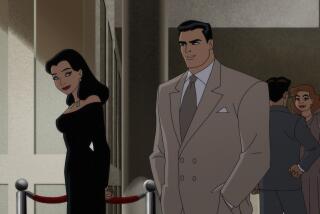Agents of Change
- Share via
The history of jazz, stretching back over 75 years now, is full of new beginnings. In hindsight, one significant start happened when the band known as the Jazz Crusaders formed in Houston and started cooking up a new, groove-oriented jazz sound in the mid-1960s.
The band, led by trombonist Wayne Henderson, saxophonist Wilton Felder, keyboardist Joe Sample and drummer Stix Hooper, captured a new audience with versions of pop songs and their own tuneful originals.
By the early ‘70s, they had dropped the “Jazz” from the name, were settled in Los Angeles, had hot young guitarist Larry Carlton on board and, in effect, set the stage for a smooth, soulful brand of jazz, which would later metamorphose into the contemporary jazz movement.
Thirty-odd years after it started, the Jazz Crusaders return to the scene--in a new incarnation but still true to its roots--and with the “Jazz” restored to its rightful place. In the last two years, the revived group has released two albums, “Happy Again” and “Louisiana Hot Sauce,” on the Sin-Drome label, has toured the world and is going strong.
You can hear what the friendly ruckus is all about when the group plays at Conejo Community Park in Thousand Oaks on Sunday, as part of the Concerts in the Park series.
The band’s rebirth was sparked by Henderson, who had traded in his trombone for production work in the ‘70s, but then got a powerful itch to play again. He had an almost 18-year hiatus, during which he wore a producer’s hat for Ronnie Laws, Roy Ayers, Ramsey Lewis and others.
Henderson said that his friend and collaborator, keyboardist Bobby Lyle, started calling him “every other day, saying, ‘You’ve got to play. We miss that sound.’ Bobby is the one who inspired me to start playing again. So I just set my horn by the bed, and every morning I’d just blow it and kept on building my chops back up. And now, as they say, ‘I’m back.’ ”
Eager to jump-start the Crusaders machine, Henderson contacted the original members of the band, but not all of them were eager to play. Hooper had given up performing, and Sample was locked into his ongoing solo career.
“I said to Wilton, ‘I’m ready to fire up the Jazz Crusaders, get back to the roots,’ ” Henderson said. “He said ‘I’m down for it.’ I took the reins, and me and Wilton are out there swinging.”
In a sense, the sultry sound of the combined trombone and tenor sax is a nucleus of the band, and a sound missing from slicker incarnations of the group.
“When Wilton and I played together, it had an interesting blend,” said Henderson. “We thought, ‘Hey, let’s go with this,’ with us sometimes playing parallel octaves and sometimes in unison with the horns. It got to be our signature, along with the gospel-funk-bebop sound--the Crusaders’ sound.”
That sound was groove-lined before such a thing was popular. In the early days, Henderson said, “We were just straight, stand-up beboppers, playing all the fast tunes. But we always had a groove and memorable melodies. Then we got to where we were just playing grooves.
“Before you know it, we added a guitar--with Larry Carlton--and everybody woke up. All of a sudden, Herbie (Hancock) and Chick (Corea) and even Miles (Davis), with ‘Tribute to Jack Johnson,’ started coming around. So we were like the co-founders of fusion, man. Nobody was doing it but us at one point.”
The vintage Crusaders hit the big screen recently, when the band was seen in the Oscar-winning documentary “When We Were Kings.” The documentary chronicles the 1974 “Rumble in the Jungle,” the legendary fight between Muhammad Ali and George Foreman in Zaire.
Originally, the film was going to focus on the festival preceding the main event. Plans for a large-scale festival were disrupted when George Foreman’s injury delayed the fight, but a concert went on anyway. Early on the night of the big concert, Henderson recalled, “there were maybe 8,000 or 10,000 people in this 500,000-seater. Then, [Zaire’s former President] Mobutu got onto the radio and said, ‘Go to the concert.’ Man, those Africans streamed in. It was absolutely unbelievable. That place filled up in the space of an hour and a half or two.”
The presence of the Crusaders in the film has the effect of a nostalgic depth charge, and reminds us of how their sound is a powerful signature of ‘70s jazz culture.
The band’s influence continues, which Henderson and Felder are reminded of now that they circulate with other jazz musicians on the festival circuit. At the North Sea Festival last month, Henderson said, “we were in the elevator in the hotel there in the Hague and David Sanborn was there with Wilton. He told Wilton that he learned how to play by imitating his solo on ‘Way Back Home.’
“Branford and Wynton Marsalis were saying, ‘Hey, man, I grew up on you guys.’ Me’Shell Ndege Ocello told Wilton that it was his bass playing that got her into playing bass.”
It’s hard to think of the Crusaders’ smooth-flowing, infectious music as revolutionary, but, in some humble way, they turned out to be important agents of change.
“We were kind of the seed for this contemporary fusion stuff,” Henderson said. “They know it. The industry knows it. We planted those seeds and it actually changed popular instrumental music.”
BE THERE
The Jazz Crusaders at 5 p.m. Sunday at Conejo Community Park, corner of Dover and Hendrix avenues, Thousand Oaks. Admission is free; 381-2747.
More to Read
The biggest entertainment stories
Get our big stories about Hollywood, film, television, music, arts, culture and more right in your inbox as soon as they publish.
You may occasionally receive promotional content from the Los Angeles Times.









